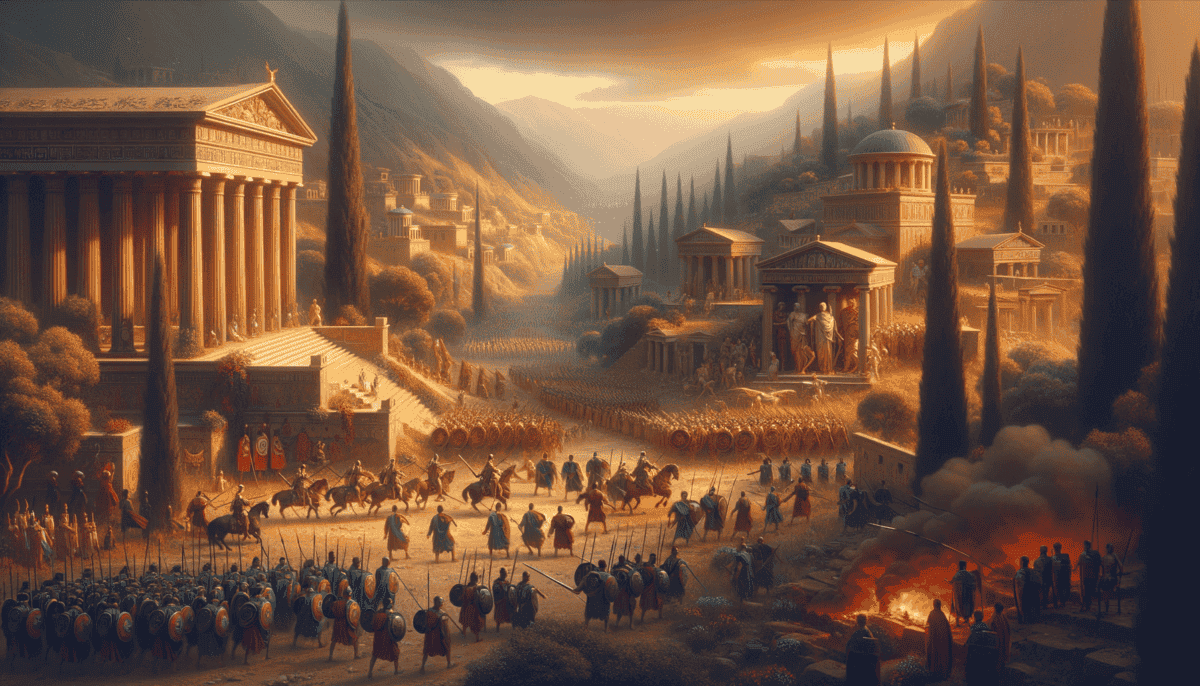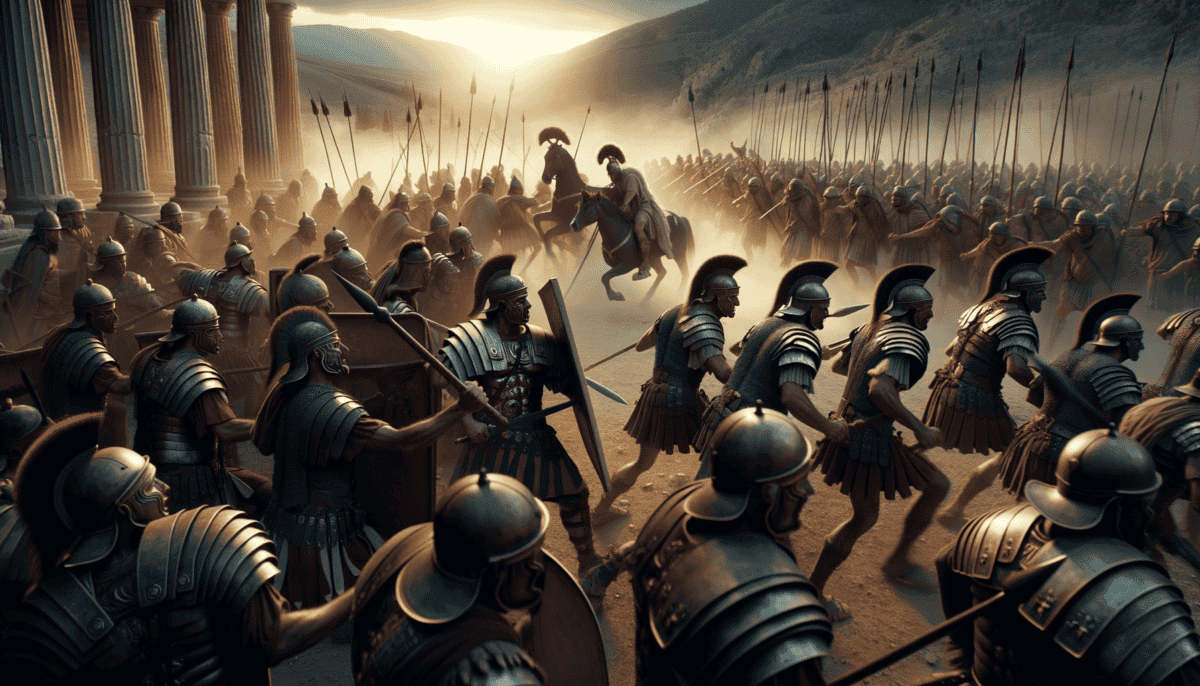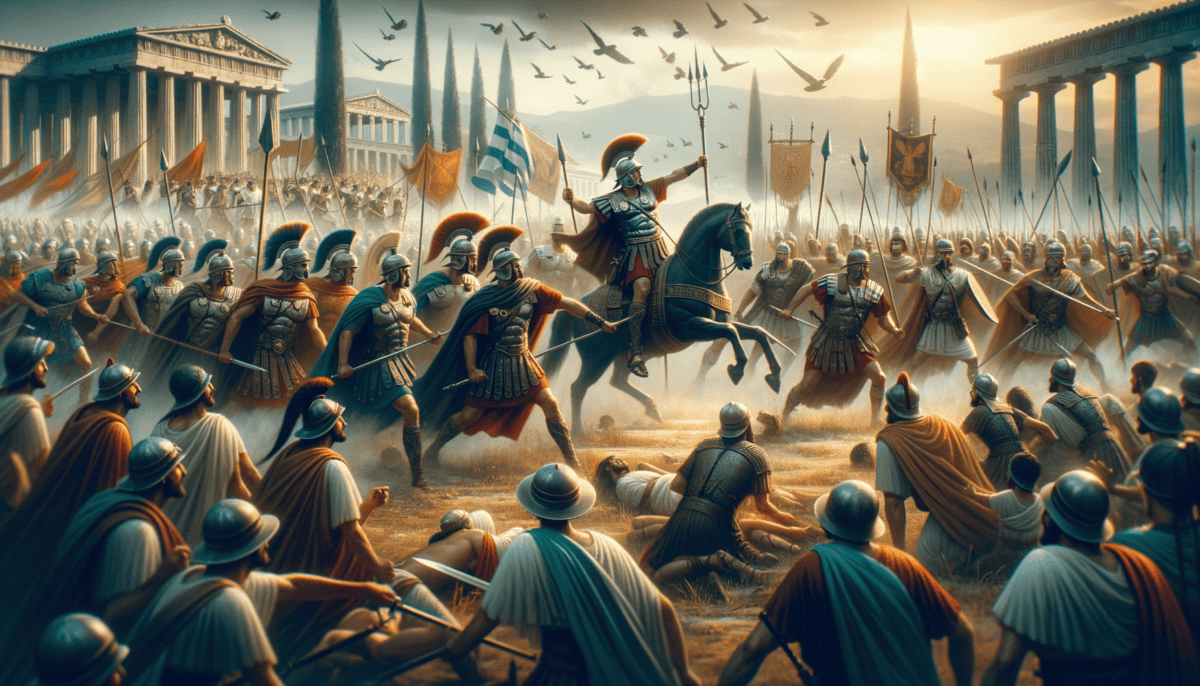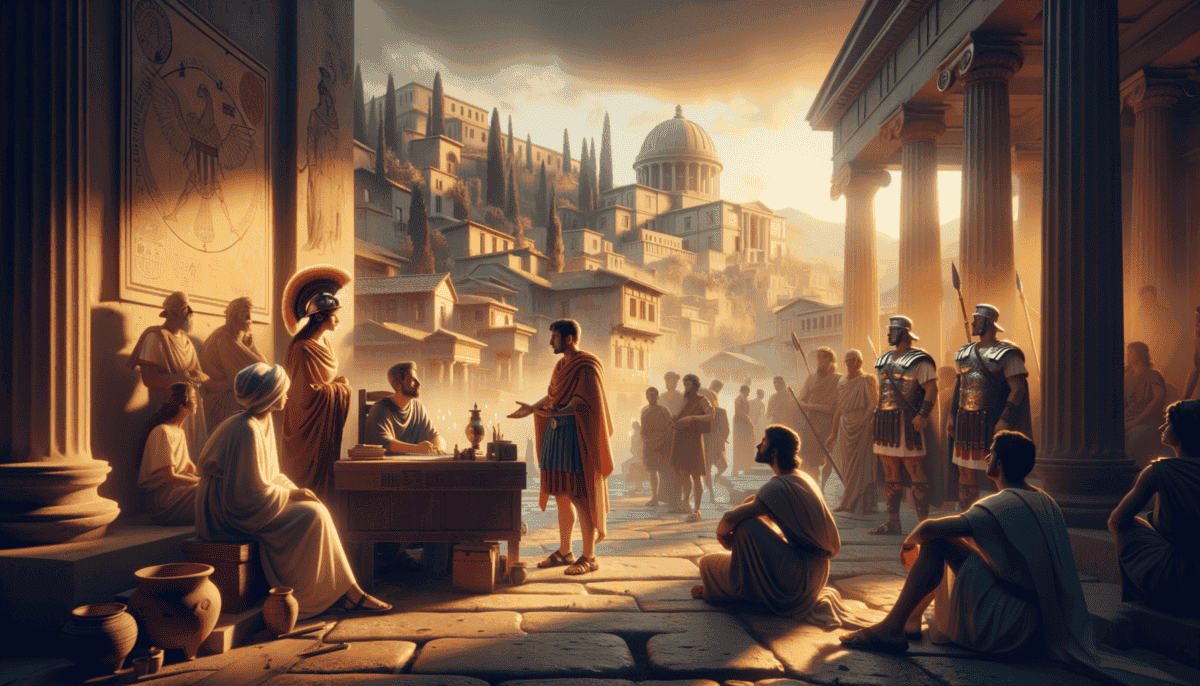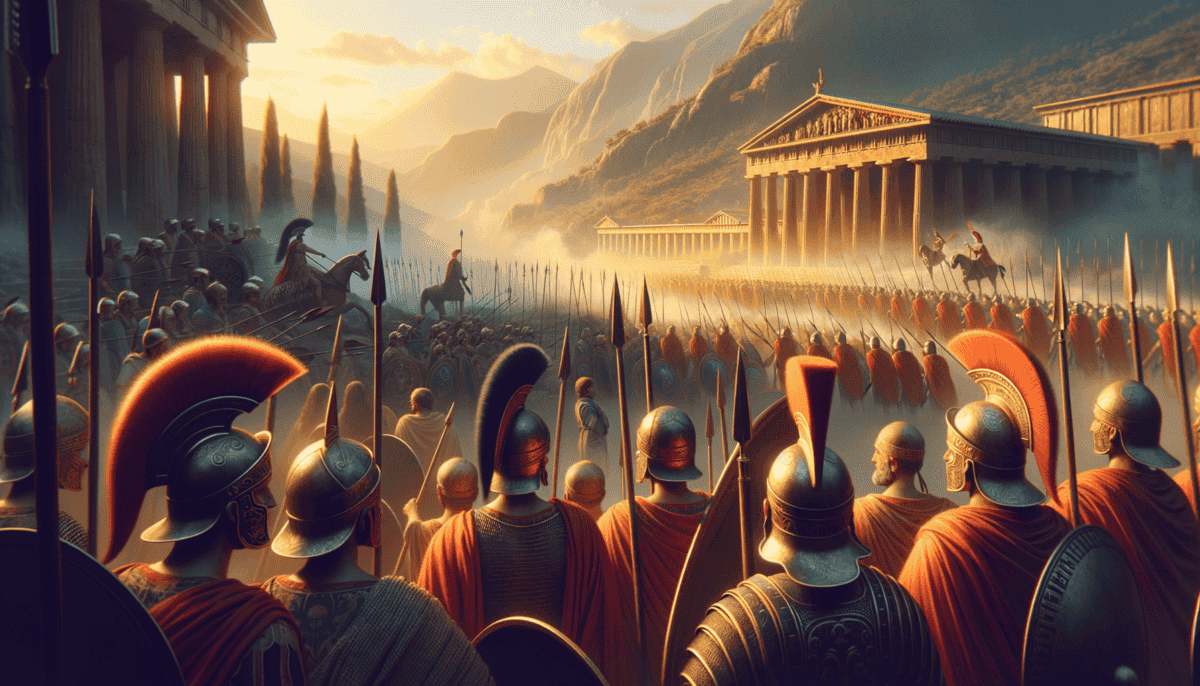Mighty Rome Meets Ancient Greece
Long ago, in a world very different from ours, two great powers faced each other across the sea. On one side was Rome, growing stronger every day. On the other side was Greece, filled with beautiful cities and wise people. ️
Marcus, a young Roman messenger, ran through the crowded streets of Rome. His sandals made soft tapping sounds on the stone roads. The air smelled like fresh bread and olive oil. He had important news for the Roman Senate.
"The Greeks are getting worried about us!" Marcus told the senators. His voice echoed in the big marble room. "They think we're becoming too powerful!"
The senators sat in their white togas, stroking their beards. One of them, Senator Flaminius, stood up. His red cape swished as he moved.
"We must be careful," he said. "The Greeks have mighty warriors and clever minds. But Rome needs to grow stronger!"
Meanwhile, in Greece, a meeting was happening too. In the beautiful city of Athens, Greek leaders gathered under olive trees.
"The Romans are different from us," said Philippos, a Greek general. "They build roads everywhere. Their army moves fast. We must watch them carefully!"
Both sides started sending messages back and forth. Sometimes they were friendly. Other times, not so much. It was like two big kids at school, each wanting to be the leader of the playground.
The Greeks were proud of their culture. They had:
• Beautiful temples
• Smart philosophers
• Amazing art
• Olympic games
• Exciting plays
But Rome was changing things. They had strong armies and new ways of fighting. They built bridges and roads that connected far-away places. Every day, they got a little stronger.
One day, a Greek trader named Alexandros visited Rome. His eyes went wide when he saw the busy streets and tall buildings.
"By the gods," he whispered, "this city is like nothing I've ever seen!"
The Romans liked some things about Greece too. They enjoyed Greek stories and art. Many Roman children had Greek teachers. But the Romans also wanted to be in charge.
Marcus watched all this happening. He saw more soldiers training in the fields outside Rome. He heard the senators talking about plans and battles. Something big was coming.
"Things are changing," his father told him one evening. "Rome and Greece can't both be the strongest. Soon, someone will have to win."
The sun set over the seven hills of Rome, painting the sky orange and purple. In Greece, people looked at the same sunset and wondered what tomorrow would bring. The great game between Rome and Greece was just beginning.
That night, as stars twinkled over both lands, nobody knew exactly what would happen next. But everyone could feel that big changes were coming. The mighty eagle of Rome and the wise owl of Greece were about to meet in ways that would change the world forever.
Battles Begin and Friends Change
The warm Mediterranean sun rose over a changed world. Roman ships with red sails moved across the blue waters. Soldiers in shiny armor marched on dusty roads. The time for just talking was over.
Young Marcus now wore armor too. He stood with the Roman army near a Greek city called Thessaly. His heart beat fast as he watched both armies prepare.
"Look at their spears!" he whispered to his friend Lucius. "The Greeks stand so close together in their lines."
The Greek army used something called a phalanx. It looked like this:
• They held very long spears
• Their shields made a wall
• They moved as one big group
• It was like a walking fortress
But the Romans had their own special way of fighting. They could split into smaller groups and move quickly. It was like the difference between a big rock and lots of little rocks – both strong, but in different ways.
"Form lines!" shouted Commander Claudius. His voice boomed across the field. "Remember your training!"
The first battle was messy and loud. Shields crashed against shields. Swords clanged together. When it was over, neither side had really won. ️
Back in Greece, not everyone agreed about fighting Rome. Some Greek cities wanted to be friends with the Romans.
"The Romans are too strong!" said Demos, a Greek merchant in Athens. "We should trade with them, not fight them."
But others, like the proud General Philippos, disagreed. "Greece must stay free!" he declared in a loud voice.
Marcus watched as more battles happened. The Romans learned new tricks. They found ways to break up the strong Greek phalanx. They built better roads to move their army faster.
One evening, Marcus sat with an old Greek soldier named Stephanos. They shared bread and cheese while watching the sunset.
"Why do we have to fight?" Marcus asked. "Greeks and Romans could be friends."
Stephanos smiled sadly. "Sometimes grown-ups make things more complicated than they need to be," he said.
The Roman army kept getting stronger. They won more battles. Some Greek cities opened their gates and welcomed the Romans as friends. Others closed their gates and got ready to fight.
Commander Claudius gathered his soldiers one night. The campfires made shadows dance on their faces.
"Tomorrow will be different," he said. "Tomorrow we march to a place called Cynoscephalae. It will be a battle that everyone remembers."
Marcus looked at the stars and thought about everything that had happened. The Romans were changing how wars were fought. The Greeks were learning that being smart wasn’t always enough – you had to be able to change too.
As everyone slept that night, the wind carried the smell of olive trees and the sound of distant waves. Tomorrow would bring the biggest battle yet, and nothing would ever be the same again.
The Great Battle of Cynoscephalae
Dark clouds rolled over the hills of Cynoscephalae. The ground was muddy from rain. Marcus stood with the Roman army, his heart beating like a drum. ️
"These hills look like a sleeping dog," whispered Lucius. The name Cynoscephalae meant "dog's head" in Greek.
Commander Claudius rode his horse along the lines. His red cape fluttered in the wind.
"Today, we show the Greeks how Romans fight!" he called out. "Stay together. Be quick. Be brave."
• Split into small groups
• Move fast up the hills
• Surprise the Greek phalanx
• Use the ground to help win
On the other side, General Philippos led the Greek army. Their long spears glinted in the morning light. The phalanx looked strong, like a forest of metal. ⚔️
"Look at their spears," said Marcus. "How will we ever get past them?"
An old soldier patted his shoulder. "Watch and learn, young one. The phalanx is strong, but it can't turn quickly. We are like water – we flow where we need to go."
Horns blew. Drums beat. The battle began!
The Roman army moved like dancers, splitting into smaller groups. Some went left, others right. The Greek phalanx tried to turn, but the muddy hills made it hard.
"Now!" shouted Commander Claudius. "Attack their sides!"
Marcus watched in amazement. The Roman groups found spaces between the Greek soldiers. The long spears that made the phalanx so strong became a problem on the uneven ground.
A Greek soldier named Alexandros fought near Marcus. Their eyes met for a moment.
"You fight well, Roman," Alexandros said. "But so do we!"
The battle raged for hours. Sweat mixed with rain. Mud covered everyone's feet. The sound of metal hitting metal filled the air. ️
Finally, something amazing happened. A young Roman officer saw a chance. He took twenty soldiers up a hill behind the Greeks. They attacked from behind!
The Greek phalanx broke apart. General Philippos waved his white cloth. The battle was over. Rome had won!
That night, Marcus helped take care of wounded soldiers – both Roman and Greek. He gave water to Alexandros, who was now a prisoner.
"What happens now?" Marcus asked.
Alexandros smiled sadly. "Now everything changes. But maybe that's not all bad. Greeks and Romans might learn from each other."
The stars came out over Cynoscephalae. The hills that had seen such fighting were quiet now. Everyone knew that this battle had changed everything. Rome was stronger than ever, but they had learned to respect Greek bravery too.
As Marcus looked at the battlefield, he remembered what his old teacher had said: "Sometimes the biggest victories aren't just about winning fights. They're about learning from each other."
A New World Begins
The sun rose over Athens, painting the marble buildings golden. Roman flags now flew next to Greek ones. Things were different after the big battle at Cynoscephalae.
Marcus walked through the busy streets with his new friend Alexandros, who was no longer a prisoner but a helper to the Romans.
“Look at this beautiful city,” Alexandros said proudly. “Our buildings tell stories of gods and heroes.”
Roman soldiers were everywhere, but they weren’t fighting. Instead, they were learning from the Greeks. Some studied in schools, while others watched Greek plays in big theaters.
“Why are you Romans so interested in our ways?” asked a young Greek boy.
Marcus smiled. “Because you Greeks know many wonderful things. We may have won the battle, but we can learn from you too.”
Commander Claudius called a big meeting. Greeks and Romans sat together in the marketplace.
“From today, we work together!” he announced. “Greeks will keep their schools and theaters. Romans will protect the cities. Together we’ll be stronger!”
But not everyone was happy. Some Greeks didn’t like having Romans in charge.
“This is our home,” whispered an old Greek man. “How can we live with these changes?”
Alexandros had an idea. He started a school where Greek teachers taught Roman children, and Roman soldiers learned Greek words.
“See?” he told Marcus. “We can share good things with each other.”
The marketplace became busier than ever. Greek vases sat next to Roman pottery. Children played games from both places. The smell of Greek and Roman food filled the air.
A little girl asked Marcus, “Are we Greek or Roman now?”
“We’re both,” he answered. “Like mixing colors to make new ones.”
One evening, Marcus and Alexandros watched the sunset from a hill.
“Things are different now,” said Alexandros, “but not all change is bad.”
Marcus nodded. “Your Greek ideas are making Rome better. And together, we can do amazing things.”
Below them, in the city, Greek music played while Roman soldiers danced. Children ran through streets speaking mixed-up Greek and Latin words. The temples glowed with lights for both Greek and Roman gods. ✨
A new world was growing, where the best of Greece and Rome came together. It wasn’t always easy, but day by day, people found ways to share their lives and learn from each other.
As night fell, stars twinkled over the city – the same stars that had watched over Greeks and Romans for hundreds of years. Now they watched over a people who were becoming something new and special together.
Changes and Challenges
The streets of Athens buzzed with activity, but not everyone felt happy about the changes. Some Greeks missed the old ways. Some Romans wanted to change things too fast. ️
Demetrius, an old Greek merchant, sat in his shop looking sad. His shelves held beautiful Greek pots next to plain Roman ones.
“Why do you look worried?” Marcus asked him.
“The Roman tax collectors want more money,” Demetrius sighed. “How can I pay when fewer people buy my Greek pots?”
In the marketplace, a group of Greek farmers talked about their problems.
“The Romans changed our farming times!” one said.
“But their new tools help us grow more food,” another replied.
Marcus watched as Alexandros tried to help. He spoke to both Greeks and Romans, trying to make things better.
“We need to work together,” Alexandros told everyone. “Greeks know the land. Romans have good tools. Together we can grow more food!”
Some young Greeks started secret meetings. They didn’t want Roman rules. But other Greeks told them to give peace a chance.
“Remember,” said a wise Greek teacher, “we still have our schools, our stories, and our way of life. The Romans respect these things.”
One day, a fire started in the marketplace. Greeks and Romans worked together to put it out. After that, people started to trust each other more.
“See?” Marcus told Commander Claudius. “When we help each other, everyone wins.”
The commander nodded. “Maybe we should listen more to Greek ideas about ruling cities.”
In the schools, Greek teachers taught Roman children about math, stars, and stories. Roman builders learned from Greek temples to make beautiful buildings. ⭐
Alexandros started a new market day where Greeks and Romans could trade freely. Soon, the streets filled with happy shoppers and sellers from both peoples.
“It’s not perfect,” Alexandros told Marcus, “but we’re learning to live together.”
Even old Demetrius began to smile more. He learned to make pots that mixed Greek beauty with Roman strength. People loved them!
At night, Marcus wrote in his diary: “Change is hard. But when we work together and respect each other, wonderful things can happen.” ✍️
The moon shone over Athens, lighting up both Greek temples and Roman buildings. In homes across the city, families – both Greek and Roman – shared stories and dreams under the same starry sky.
A New Beginning
Years passed, and something amazing happened in Greece. The mixing of Greek and Roman ideas made both places better!
Marcus, now older and wiser, walked through Athens with his young son, Julius. The city looked different now – beautiful Greek buildings stood next to strong Roman ones.
“Father, why do some buildings look different from others?” Julius asked.
“That’s what makes our city special,” Marcus smiled. “We learned from each other.” ️
In the marketplace, Greek and Roman children played together. They spoke both languages and shared both cultures’ games.
“Look!” Julius pointed to a school. Inside, a Greek teacher taught Roman children about stars and numbers. Next door, a Roman teacher showed Greek children how to build strong bridges.
Alexandros’s son now ran the busy market. He sold goods from all over the world. “Rome’s roads helped us trade with far-away places,” he told Marcus.
Even the Roman leaders changed their ways. They read Greek books and used Greek ideas to make better laws. Some even spoke Greek at home!
“Remember old Demetrius?” Marcus asked Julius. “His shop is still there, but now his grandchildren sell both Greek and Roman things.”
They passed a temple where Greeks and Romans prayed together. People didn’t fight about different gods anymore. Instead, they shared stories about them. ⚡
At the theater, actors performed both Greek plays and Roman stories. The crowd cheered for both!
“Father, are we Roman or Greek?” Julius asked.
Marcus thought for a moment. “We’re both, son. We’re stronger together than apart.”
That evening, they joined a big feast. Greeks and Romans sat together, sharing food and telling stories. Some wore Greek clothes, others Roman ones. Nobody cared anymore.
An old Greek poet stood up and spoke: “Once we were two peoples. Now we are one family under the same sky.”
Marcus looked at the happy faces around him. The Romans hadn’t just won Greece – Greece had also changed Rome. Both places were better for it.
The sun set over Athens, painting the sky in beautiful colors. Greek temples and Roman buildings glowed golden in the evening light. In homes across the city, children dreamed of a future where different peoples could live and learn together.
And that’s how Rome won Greece, not just with swords, but with respect and learning. The two great peoples became one, creating something new and wonderful that would last for many years to come. ⭐


